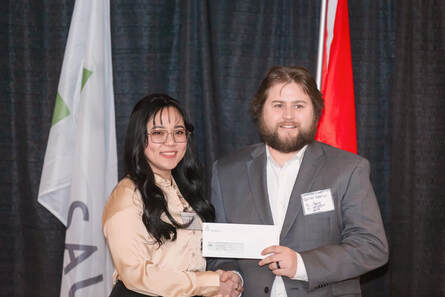| Earlier this week, The Kensington Conservancy presented this year's Pam Bent Conservation Award to Shacynne Anne Sarroza. This annual award goes to a Sault College student in a Natural Environment and Outdoor Studies program who demonstrates good leadership skills, good academic achievement, is a global thinker and demonstrates a passion above and beyond the program expectations. It is in memory of Pam Bent, a seasonal resident in the Desbarats area who had a passion for education and nature. Congratulations Shacynne, we wish you the best of luck in your future! You can read about Shacynne's impressive background below. -- |
Hello, my name is Shacynne Anne Sarroza and I am the recipient of the Pam Bent Conservation Award from The Kensington Conservancy. I am a recent graduate of Fish and Wildlife Conservation at Sault College. I am from the Philippines and hold a Bachelor’s degree in Fisheries while currently working on my master's thesis for Aquaculture. I am also a registered Fisheries Professional, an international judge of freshwater ornamental fish in Asia, and have a National Certificate for Organic Agriculture Production.
I grew up in Barotac Nuevo, a beautiful town in the province of Iloilo, Philippines whose main industry and capital are in fishing and agriculture. Growing up, my brother and I always received a science workbook as a summer gift from our parents. I believe this is where my passion for science started. My father is a big fan of nature and animal documentaries, which led to my dream of being part of a conservation team while watching an episode of National Geographic. Our dreams are sometimes challenged by the resources we have. Studying fisheries is not my first choice of degree but where am I now in life and career made me believe that redirection can be a blessing in disguise. My fisheries journey started while being part of the Bureau of Fisheries and Aquatic Resources and a partnership with a private company for the sex-reversal production of Tilapia. It continued as an Aquaculturist in charge of Tilapia production, selective breeding of freshwater fish species, and fish health management. Then I took on the role of an international judge for ornamental fish shows in Asia and during Aquarama in China. I had the privilege to represent the Philippines in Guppy Fish competitions in the Philippines, Taiwan, Malaysia, and Singapore. I became overly passionate and started holding free training seminars for guppy fish groups that want to learn selective breeding and culture techniques for ornamental fish species.
When COVID hit, I was locked down in my hometown and decided to take my Master’s after things started to settle down and managed to finish the academic requirements. This is when my urge to pursue conservation was ignited again, and now I am a graduate of Fish and Wildlife Conservation at Sault College. During my studies with Sault College, I was sent to Brazil where I finished my internship with the Federal Institute of Minas Gerais Machado. I finished my internship with courses in forest restoration techniques, fish culture, phytopathology, plant biotechnology, coffee quality techniques and farming technology, equine therapy, butchery, and canine handling and drug detection. As a result of this internship opportunity, I published a scientific paper on the micropropagation of Cattleya loddigesii in a temporary immersion bioreactor with the generous help of the people I worked with in the biotechnology department. The focus of the study is to successfully introduce an in vitro-grown threatened species of native Brazilian orchid to the wild.
Currently, I am looking for job opportunities to enter the fish, wildlife, and natural conservation workforce, and am very excited about what the future holds for me!
I grew up in Barotac Nuevo, a beautiful town in the province of Iloilo, Philippines whose main industry and capital are in fishing and agriculture. Growing up, my brother and I always received a science workbook as a summer gift from our parents. I believe this is where my passion for science started. My father is a big fan of nature and animal documentaries, which led to my dream of being part of a conservation team while watching an episode of National Geographic. Our dreams are sometimes challenged by the resources we have. Studying fisheries is not my first choice of degree but where am I now in life and career made me believe that redirection can be a blessing in disguise. My fisheries journey started while being part of the Bureau of Fisheries and Aquatic Resources and a partnership with a private company for the sex-reversal production of Tilapia. It continued as an Aquaculturist in charge of Tilapia production, selective breeding of freshwater fish species, and fish health management. Then I took on the role of an international judge for ornamental fish shows in Asia and during Aquarama in China. I had the privilege to represent the Philippines in Guppy Fish competitions in the Philippines, Taiwan, Malaysia, and Singapore. I became overly passionate and started holding free training seminars for guppy fish groups that want to learn selective breeding and culture techniques for ornamental fish species.
When COVID hit, I was locked down in my hometown and decided to take my Master’s after things started to settle down and managed to finish the academic requirements. This is when my urge to pursue conservation was ignited again, and now I am a graduate of Fish and Wildlife Conservation at Sault College. During my studies with Sault College, I was sent to Brazil where I finished my internship with the Federal Institute of Minas Gerais Machado. I finished my internship with courses in forest restoration techniques, fish culture, phytopathology, plant biotechnology, coffee quality techniques and farming technology, equine therapy, butchery, and canine handling and drug detection. As a result of this internship opportunity, I published a scientific paper on the micropropagation of Cattleya loddigesii in a temporary immersion bioreactor with the generous help of the people I worked with in the biotechnology department. The focus of the study is to successfully introduce an in vitro-grown threatened species of native Brazilian orchid to the wild.
Currently, I am looking for job opportunities to enter the fish, wildlife, and natural conservation workforce, and am very excited about what the future holds for me!


 RSS Feed
RSS Feed